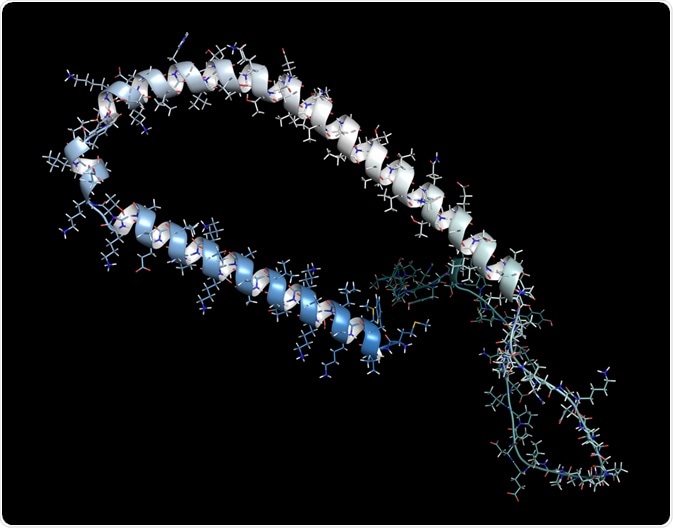Studies have uncovered that abnormalities in the alpha-synuclein protein are likely a causal factor for numerous diseases, including Parkinson’s disease, multiple system atrophy (MSA), dementia with Lewy bodies (DLB), and pure autonomic failure (PAF).

Image Credit: StudioMolekuul/Shutterstock.com
While the exact pathways are yet to be uncovered, it is believed that there is a genetic basis to the re-regulation of the protein, which has been seen to govern several essential functions, including that of dopamine transmission.
What is Alpha-synuclein?
The alpha-synuclein (α-syn) protein is found in various locations around the body, such as the heart, the skeletal muscles, and the gut. However, it is most abundant in the human brain. Here, the protein is found concentrated in the synapses of the neurons and is related to the function of transmission of chemicals across the synaptic cleft.
This process of neurotransmission is an essential process that takes place constantly in the brain and is implicated in functions from learning and memory to speech and movement. De-regulation of neurotransmission has been linked with a myriad of psychological and neuropathological diseases.
While the role of the alpha-synuclein is still not completely understood, research has given some insights into what, potentially, are its main functions. Evidence has revealed that alpha-synuclein is involved in the regulation of the transportation of dopamine from one neuron to the next.
Dopamine is a neurochemical that is responsible for controlling both movements and emotional responses, it is known to have a critical role in Parkinson’s disease (PD), with the loss of cells that produce the substance resulting in a lack of movement control, leading to the characteristic movement symptoms of the disease.
Alpha-synuclein and disease
The protein alpha-synuclein is arguably the most investigated neurological contributor to the neurodegeneration that is characteristic of the neuropathological disease, Parkinson’s disease. The discovery of its association with the disease provided the very first piece of evidence to Parkinson’s disease is a result of a genetic defect. While the protein has mostly been linked with Parkinson’s disease, a growing body of evidence suggests its wider role in disease initiation and progression.
The synucleinopathies
The protein has also been implicated in other diseases, such as multiple system atrophy (MSA), dementia with Lewy bodies (DLB), and pure autonomic failure (PAF). Because of their relationship to the alpha-synuclein protein, these diseases are known as the synucleinopathies or α-Synucleinopathies.
While the exact function of the protein is not clear in these diseases, it is strongly suggested that the accumulation of toxic intracellular aggregates of the alpha-synuclein protein within the brain’s neurons, nerve fibers, or glial cells is the root of the cause.
Through various cellular and animal models, researchers have been able to understand the synucleinopathies through their association with alpha-synuclein and the impact of its abnormal accumulation. Since this discovery, a large body of research has dedicated efforts to uncovering the molecular pathways involved, as well as identifying potential therapeutic targets.
Various studies have attempted to directly target the alpha-synuclein protein to develop new therapeutic techniques for use with the synucleinopathies. However, despite extensive research, the full functions of this protein remain elusive. Much work has provided evidence that removing the protein from neurons has a significant impact on several key intracellular processes and that the de-regulation of some of these results in neurodegeneration.
Loss of function of alpha-synuclein and synucleinopathies
The evidence that suggests that the development of the various synucleinopathies may be a result of improper function of the alpha-synuclein protein has gained much traction. Studies have uncovered that some of the functions of alpha-synuclein may become impaired in these diseases, and while the pathways are still not thoroughly elucidated, much progress has been made into uncovering the role of this protein in normal neuronal function, as well as in neurotransmitter production, mitochondrial function, and calcium homeostasis.
This area of research is helping to establish alpha-synuclein modulating therapies through defining how alpha-synuclein works in a healthy brain, and how abnormal functioning could impact the brain, leading to disease.
Genetic support for the role of alpha-synuclein
Genetic evidence has provided support for the role of deregulation of the alpha-synuclein protein in Parkinson’s disease. Over two decades ago, in 1997, a team of researchers published a paper reporting that genetic mutations leading to the SNCA gene, which encodes for alpha-synuclein, being replaced with G209A, were linked with Parkinson’s disease.
Replications of these findings have been consistently reported in further studies. Having a family history of Parkinson’s disease increases an individual’s risk of developing the disease, also, early-onset Parkinson's disease is considered to be at least in part heredity.
The hereditary aspect of the disease supports alpha-synuclein’s suspected involvement as a causal factor, due to the research showing the genetic roots of abnormal function of the alpha-synuclein protein.
Future research
While the exact nature of how alpha-synuclein initiates and maintains disease is not fully understood, there is a mounting body of evidence to show that the protein is essential to several key functions, the de-regulation of which is likely to have a profound impact.
Namely, the regulation of dopamine, which is characteristically decreased in Parkinson’s disease. Future research will continue to delve into the mechanisms of alpha-synuclein and uncover new potential avenues for the development of treatment for the synucleinopathies.
Sources:
Martí, M., Tolosa, E. and Campdelacreu, J. (2003). Clinical overview of the synucleinopathies. Movement Disorders, 18(S6), pp.21-27. https://www.ncbi.nlm.nih.gov/pubmed/14502652
Spillantini, M. and Goedert, M. (2006). The α-Synucleinopathies: Parkinson's Disease, Dementia with Lewy Bodies, and Multiple System Atrophy. Annals of the New York Academy of Sciences, 920(1), pp.16-27. https://www.ncbi.nlm.nih.gov/pubmed/11193145
Stefanis, L. (2011). -Synuclein in Parkinson's Disease. Cold Spring Harbor Perspectives in Medicine, 2(2), pp.a009399-a009399. https://www.ncbi.nlm.nih.gov/pmc/articles/PMC3281589/
Further Reading
Last Updated: Feb 3, 2020